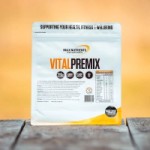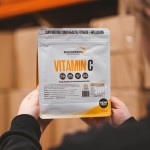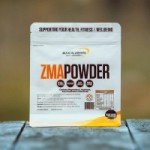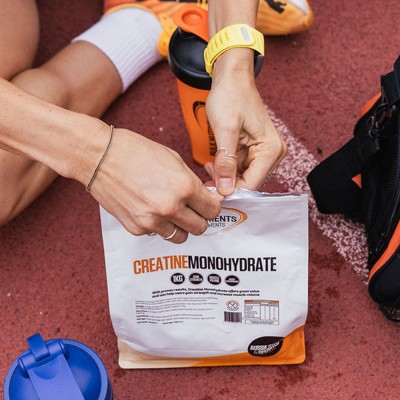Why Do I Need to Supplement With Vitamins?

The role vitamins play in supporting optimal health
Vitamins are an integral part of our health and well-being.
They are organic food substances found only in plants and animals and are essential to the normal functioning of our bodies.
And if we don't get enough, it can be harmful to our health. So, let's begin with vitamin A.
Vitamin A helps your immune system function correctly
Vitamin A is also known as retinol, and has many important functions:
- Helping your immune system operate properly
- Helping vision in darker lights
- Keeping skin (and your nose) healthy
We'll find vitamin A in the following foods:
- Liver
- Eggs
- Cheese
- Oily Fish
- Fortified low-fat spreads
- Yoghurt and Milk
We can also get vitamin A by consuming beta-carotene, as it can be converted into retinol! You'll find beta-carotene in:
- Yellow, red and green (leafy) vegetables (spinach, carrots, sweet potatoes and red peppers)
- Yellow fruits like mango, papaya, and apricots
So how much Vitamin A do you need?
The vitamin A content of a food is normally measured in micrograms (µg or mcg) of retinol equivalents (RE). The requirements are:
- 700mcg a day for men
- 600mcg a day for women
Most of us should be able to get enough vitamin A from our diets.
Vitamin B supports your brain, cells and energy levels
Vitamin B has many faces! Here are the many types:
- Thiamin (vitamin B1)
- Riboflavin (vitamin B2)
- Niacin (vitamin B3)
- Pantothenic acid
- Vitamin B6
- Biotin (vitamin B7)
- Folate and folic acid
- Vitamin B12
To make it simple, I've put the above into an easy-to-digest table:
| Vitamin | Role | Sources | How much? |
|---|---|---|---|
| Thiamin (Vitamin B1) | Release energy from food. Keep the nervous system healthy. | Peas, bananas and oranges, nuts, wholegrain breads, liver. | 1mg a day for men. 0.8mg a day for women. |
| Riboflavin (Vitamin B2) | Keep skin, eyes and the nervous system healthy. Help body release energy from food. | Milk, eggs, fortified breakfast cereals, mushrooms, plain yoghurt. | 1.3mg a day for men. 1.1mg a day for women. |
| Niacin (Vitamin B3) | Help the body release energy from food. Keep the nervous system and skin healthy. | Meat, fish, wheat flour, eggs. | 16.5mg a day for men. 13.2mg a day for women. |
| Pantothenic acid | Helping the body to release energy from food. | Chicken, beef, liver and kidneys, eggs, avocado, mushrooms. | No amount set |
| Vitamin B6 aka pyridoxine | Helping us store store energy from protein and carbs. Helping us form haemoglobin. | Pork, chicken, turkey, fish, peanuts, soya beans, wheatgerm, oats, bananas, milk. | 1.4mg a day for men. 1.2mg a day for women. |
| Vitamin B7 aka Biotin | Biotin is needed in very small amounts to help the body make fatty acids. | Egg yolk, liver, Cereals (wheat, oats), Spinach, Mushroom, Rice, Dairy items and breast milk. | 30mcg a day for men. 30mcg a day for women. |
| Folate and folic acid aka Vitamin B9 | The body form healthy red blood cells | Liver, Broccoli, brussels sprouts, leafy green vegetables, peas, chickpeas and kidney beans, breakfast cereals fortified with folic acid. | 200mcg a day for men. 200mcg a day for women. |
| Vitamin B12 | Make red blood cells. Keeping the nervous system healthy. Release energy from food. Use folate. | Meat, fish, milk, cheese, eggs, some fortified breakfast cereals. | 1.5mcg a day for men. 1.5mcg a day for women. |
Graph adapted from here.
Vitamin C protects your cells, blood vessels, and helps to heal wounds
This brings us to vitamin C, also called ascorbic acid.
Vitamin C's role is to:
- Help us protect cells and keep them healthy
- Maintain healthy skin, blood vessels, bones and cartilage
- Help heal wounds
And we can get sources of vitamin C from:
- Oranges
- Orange juice
- Peppers
- Strawberries
- Blackcurrants
- Broccoli
- Brussels sprouts
- Potatoes
And how much vitamin C do you need?
40mg of vitamin C a day for men and women.

From the sun, Vitamin D strengthens bones and teeth
Vitamin D helps us regulate calcium and phosphate, which keeps our teeth, bones and muscles healthy.
And we can get it from:
- Oily fish (salmon, sardines, herring and mackerel)
- Red meat
- Liver
- Egg yolks
- Sunlight
So, how much do we need?
Recently revised recommendations state 600 IU (15 micrograms) for those aged 1–70 years and 800 IU (20 micrograms) for those over 71 years of age. The upper limit is listed as 4000 IU (100 micrograms).
Vitamin E supports your eyes, skin, and immune system
Vitamin E helps maintain healthy eyes and skin and strengthens our immune system.
And we can find it in:
- Plant oils – (vegetable oil), sunflower, soya, corn and olive oil
- Nuts and seeds
- Wheatgerm (cereals and cereal products)
So how much vitamin E do you need?
- 4mg a day for men
- 3mg a day for women
This brings us to our last vitamin, vitamin K.
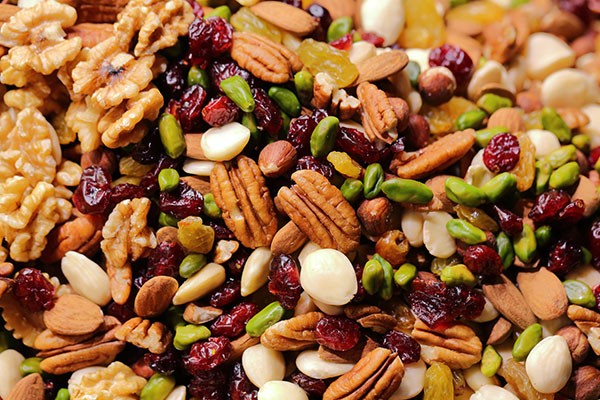
Vitamin K helps keep your bones strong
We need vitamin K for helping wounds to heal, and for bone formation and bone health.
And we'll find Vitamin K in:
- Broccoli
- Spinach
- Vegetable oils
- Cereal grains
- Small amounts found in meat and dairy
So, how much vitamin K do you need?
Men and women need approximately 1 microgram a day of vitamin K for each kilogram of their body weight.
Now you know why all vitamins are important!
The bottom line is that vitamins A through to K are an important part of our health and wellbeing and must be obtained through our diet. They are organic food substances found only in plants and animals and are essential to the normal functioning of our bodies.
Going without enough of these vitamins can be harmful to our health. Greens, liver, and egg yolks contain the bulk of all vitamins and are excellent food choices for ensuring these needs are met.

Dayne Hudson
Like many, Dayne was once desperate to lose weight and get into shape. But everyone he asked, everything he read, lead to the same place... nowhere.
His journey started there - researching science journals and completing a Sports Nutrition Specialist qualification so he could make weight loss easier.
References:
- Thompson J. Vitamins, minerals and supplements: part two. Community Pract. 2005 Oct;78(10):366-8. PMID: 16245676.
- Chea EP, Lopez MJ, Milstein H. Vitamin A. 2021 Jul 25. In: StatPearls [Internet]. Treasure Island (FL): StatPearls Publishing; 2022 Jan–. PMID: 29493984.
- Dawson MI. The importance of vitamin A in nutrition. Curr Pharm Des. 2000 Feb;6(3):311-25. doi: 10.2174/1381612003401190. PMID: 10637381.
- https://www.nhs.uk/conditions/vitamins-and-minerals/vitamin-a/
- Saleem F, Soos MP. Biotin Deficiency. 2021 Sep 24. In: StatPearls [Internet]. Treasure Island (FL): StatPearls Publishing; 2022 Jan–. PMID: 31613531.
- https://www.nhs.uk/conditions/vitamins-and-minerals/vitamin-b/
- Caryl A Nowson, John J McGrath, Peter R Ebeling, Anjali Haikerwal, Robin M Daly, Kerrie M Sanders, Markus J Seibel and Rebecca S Mason
- Med J Aust 2012; 196 (11): 686-687. || doi: 10.5694/mja11.10301 https://www.nhs.uk/conditions/vitamins-and-minerals/vitamin-k/
- DiNicolantonio JJ, Bhutani J, O'Keefe JH. The health benefits of vitamin K. Open Heart. 2015 Oct 6;2(1):e000300. doi: 10.1136/openhrt-2015-000300. PMID: 26468402; PMCID: PMC4600246.
Related Blogs

Which Steak Cuts Are Leanest and Best for Fat Loss?
Posted by Dayne Hudson
Estimated reading time: 6 minutes

Everything You Need to Know About Red Fusion
Posted by Bulk Nutrients
Estimated reading time: 6 minutes
